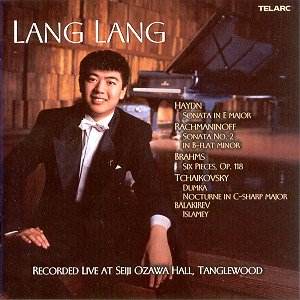Joseph HAYDN (1732-1809) Keyboard
Sonata in E, Hob.XXVI:31.
Sergei RACHMANINOV
(1873-1943) Piano Sonata No. 2 in B flat minor, Op. 36.
Johannes BRAHMS
(1833-97) Six Pieces, Op. 118.
Peter Ilyich
TCHAIKOVSKY (1840-93) Dumka. Nocturne
in C sharp minor, Op. 19 No. 4.
Mily BALAKIREV
(1837-93) Islamey.
 Lang Lang (piano).
Lang Lang (piano).
 Telarc CD-80524 [DDD]
[78.28]
Telarc CD-80524 [DDD]
[78.28]
Crotchet
AmazonUK
AmazonUS

Taken from live concerts in the Florence Gould Auditorium in the Seiji Ozawa
Concert Hall in Tanglewood, this disc gives the listener a chance to appraise
the talents of a young pianist hailed by the Chicago press as 'a phenomenal
talent'. The Chinese pianist Lang Lang, on paper, looks to be your typical
Oriental Wunderkind, beginning his keyboard studies at the age of three and
including virtuoso Romantic war-horses as part of his recital repertory.
The music, however, tells a different story.
True, there is much virtuoso material here, and Lang Lang is equipped with
a technique to match the most fearsome test. But it is in the tender moments
that he shows the other, more human side of his character and it is his ability
to touch a nerve by a delayed accent or by some insightful highlighting that
raises him above the norm.
The Haydn is therefore not a curtain-raiser, but receives careful shaping
and attention. Published in Vienna in 1776 as part of a set of six sonatas,
it contains much delightful quirkiness and wit. Lang Lang employs a light
tone, seemingly in imitation of an early piano. His staccato is clear and
crisp and the light, limpid textures of the second movement give a hint towards
the sensitivities to come. The finale is a delight, fresh and full of discovery.
It is a long way in terms of years and musical vocabulary between Haydn and
the larger than life face of Rachmaninov. Memories of Horowitz (Philips 456
844-2) in the Second Sonata (1913) are inevitable, but Lang Lang is able
to bring off the sweeping gestures with aplomb. Perhaps what impresses most
is the second movement (marked 'non allegro') which comes across as improvisatory
and nostalgic without losing its innate sense of musical flow.
Late Brahms provides a catalogue of pitfalls for the unwary, and maturity
is of the utmost importance. Lang Lang's account is impressive beyond his
years, especially in the tender A minor Intermezzo (No. 2) where his
voice-leading, both in contrapuntal and in chordal passages, is particularly
worthy of mention. The final piece, the E flat minor Intermezzo, seems to
enter into another world, one of half lights and dark mystery that Lang Lang
seems especially sensitive to.
Tchaikovsky's Dumka, Op. 59 is a quirky, sectional piece (the theme
is very close to the famous 'Song of the Volga Boatmen'): his Nocturne, Op.
19 No. 4 is far more successful, and Lang Lang is beautifully languid in
response.
The virtuoso side of Lang Lang's persona shows itself in his interpretation
of Balakirev's Islamey, although as a whole it lacks the final throes
of abandon. Characterised by clean pedalling and a Bolet-like approach to
Lisztian lyricism, his account makes a worthy partner to that of, for example,
Katchen (Philips 456 856-2) or Ogdon (456 916-2) without displacing either.
It is the delicate, interior passages of many of the pieces in this recital
that remain in this reviewer's memory.
Colin Clarke

